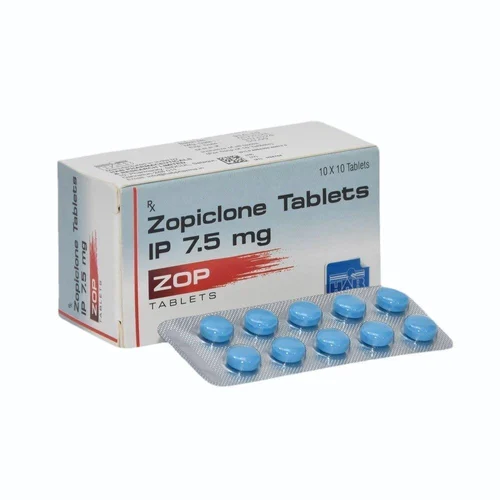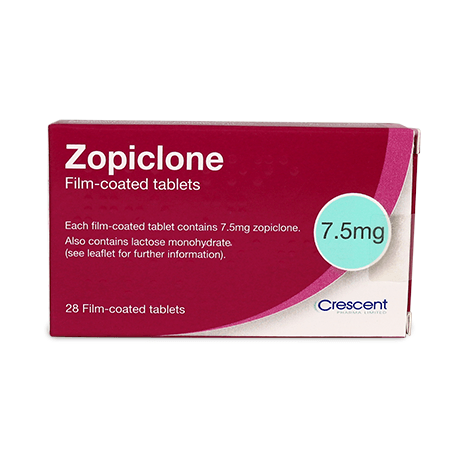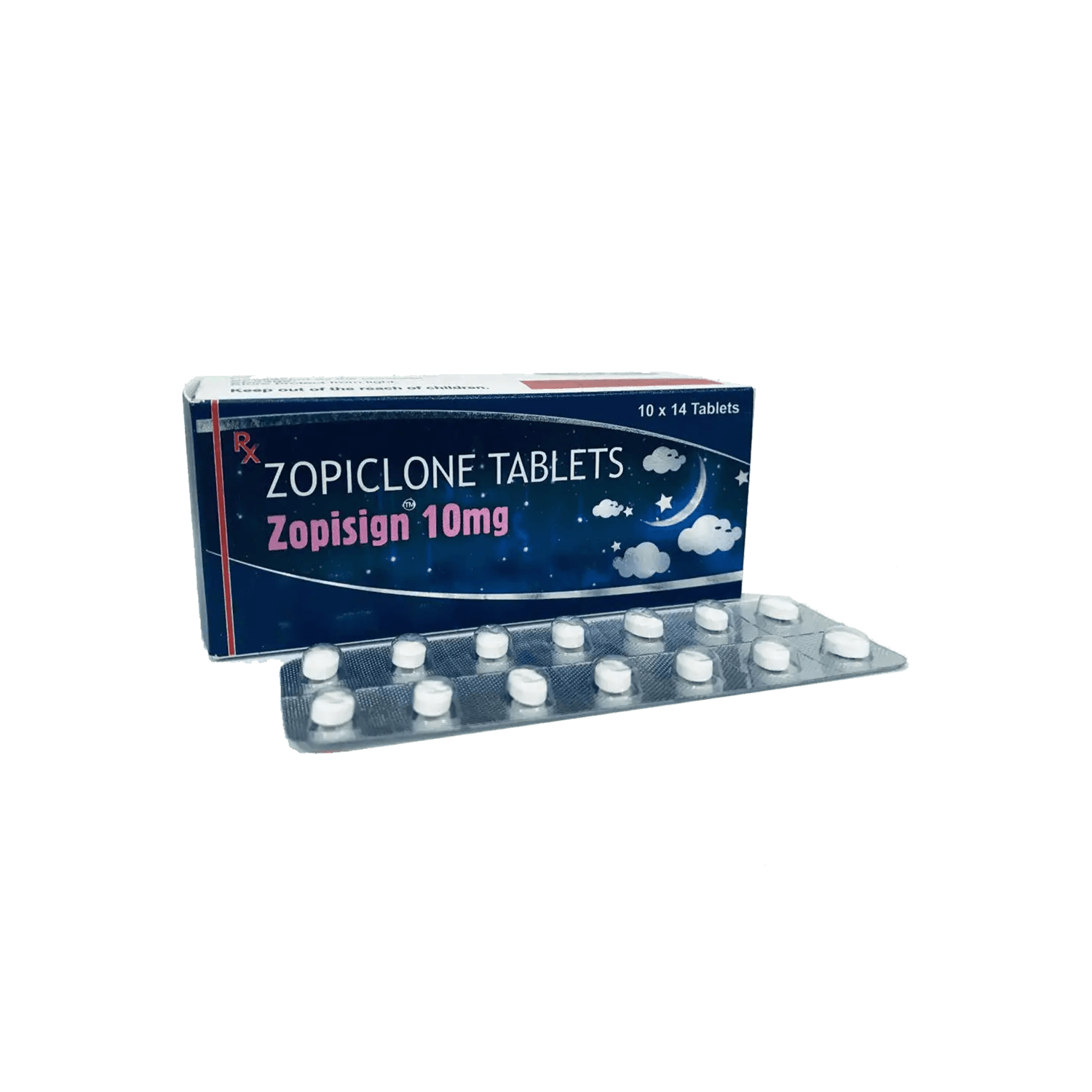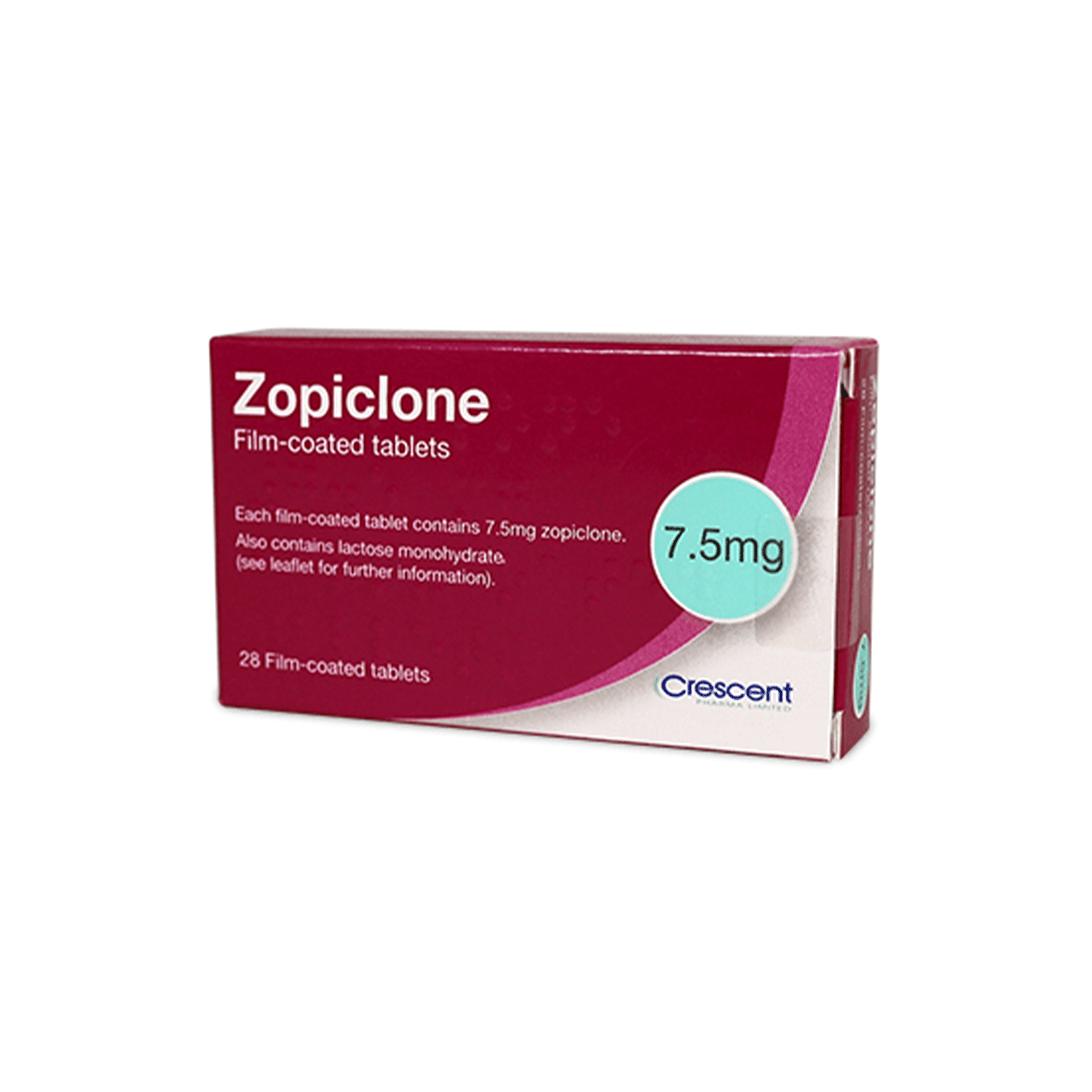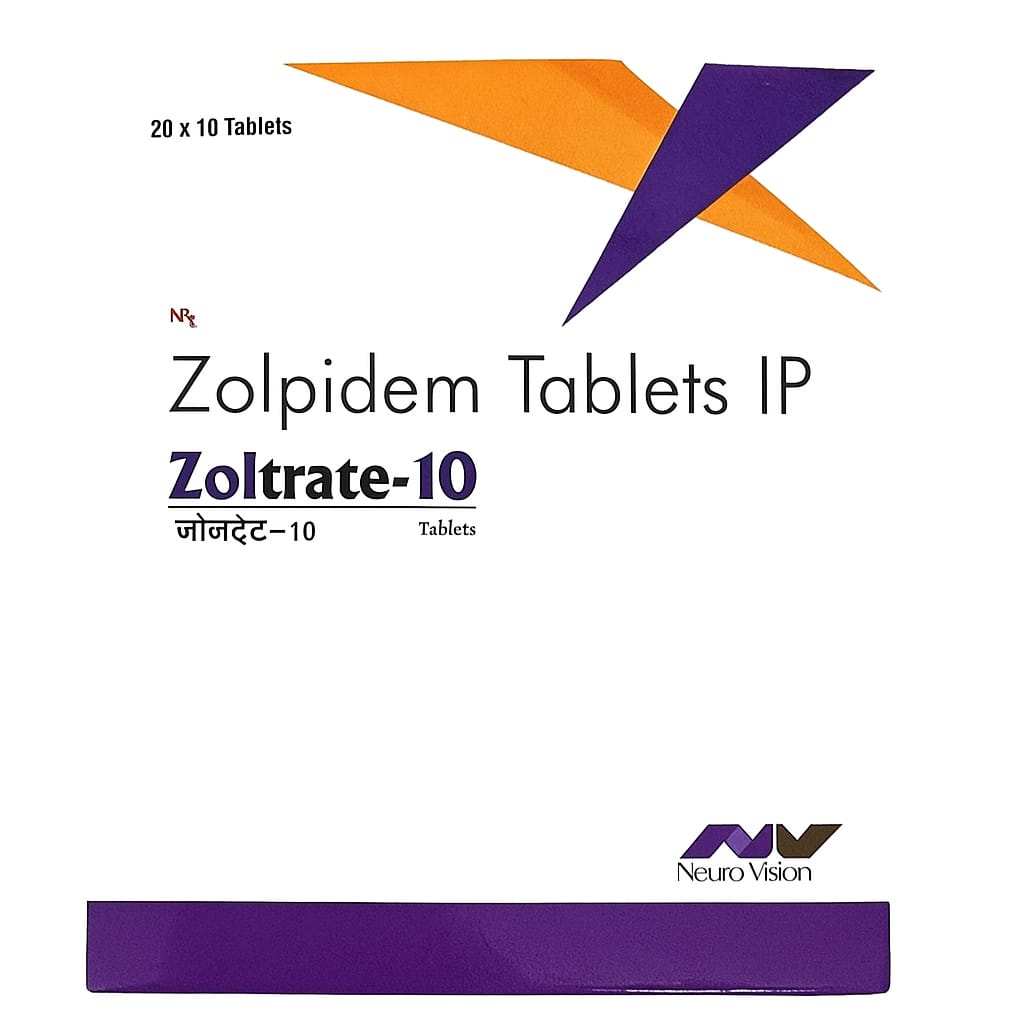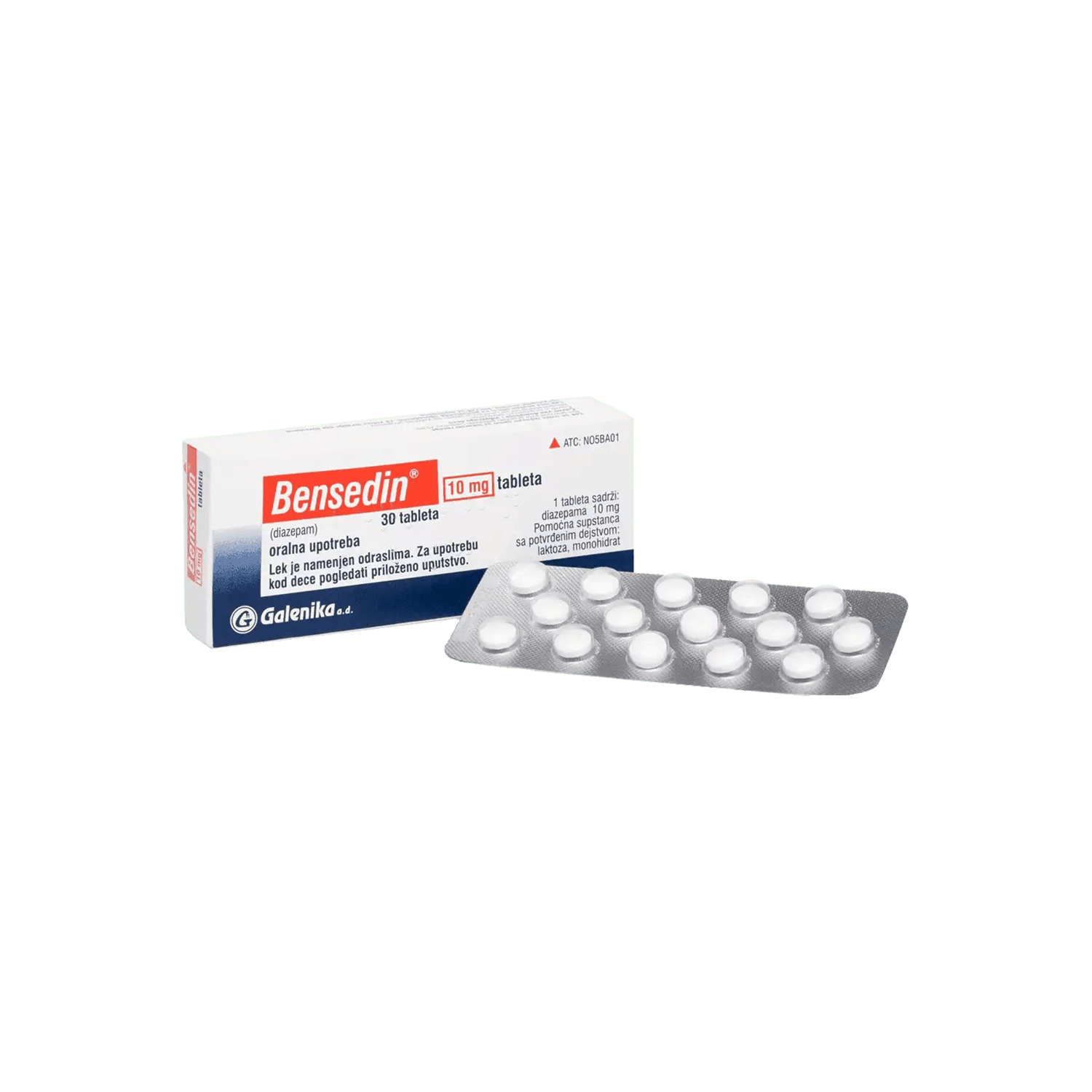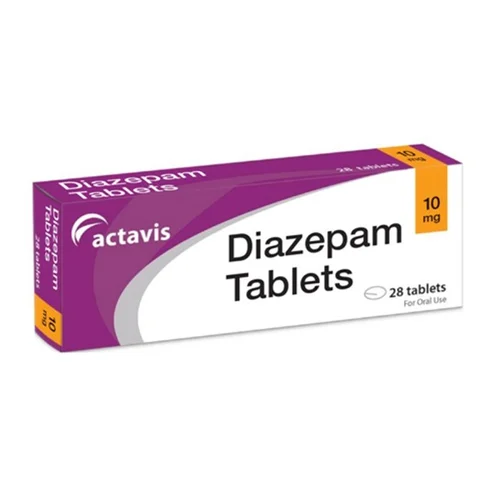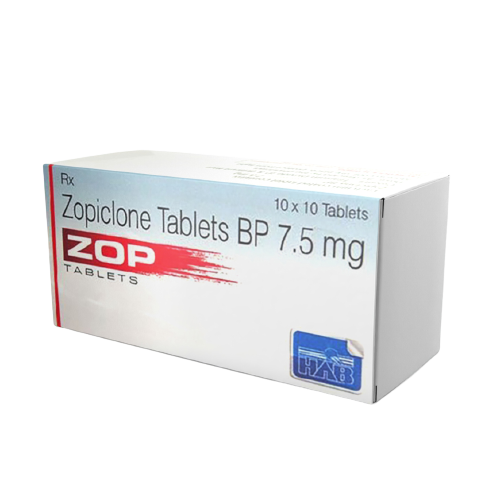Description
Zopiclone Tablets 7.5mg
However, millions of individuals worldwide experience difficulty falling asleep or staying asleep, even though sleep is crucial for our mental and physical well-being. For some, insomnia is a transient condition that is associated with stress or transitory changes, while for others, it becomes a recurring struggle. Zopiclone tablets are a medication that is frequently prescribed for the temporary alleviation of insomnia.
Zopiclone is a member of the “Z-drugs” class of medications, which are chemically distinct from benzodiazepines but exert a similar effect on the brain. Zopiclone is prescribed by physicians for patients who require immediate assistance with their sleep, particularly when lifestyle modifications and non-pharmacological treatments are inadequate.
In this comprehensive guide, we will investigate all the essential information you require regarding zopiclone tablets, such as their mechanism of action, advantages, potential adverse effects, risks of dependence, safe usage guidelines, and alternative sleep aids for improved sleep.
What are Zopiclone tablets?
Zopiclone is a medication that is prescribed to alleviate insomnia. It functions by decreasing cerebral activity, thereby facilitating the process of falling asleep and maintaining it for an extended period.
Tablets in the following strengths are frequently available: 3.75 mg and 7.5 mg.
Onset: Effects are observed within 30–60 minutes of ingestion.
Duration: Typically effective for a period of 6–8 hours of sleep.
Class: Non-benzodiazepine hypnotic (Z-drug).
Zopiclone is typically prescribed for a brief period of 2–4 weeks, as prolonged use elevates the likelihood of tolerance and dependence.
What is the mechanism of action for Zopiclone?
For an understanding of the manner in which zopiclone tablets facilitate sleep, it is beneficial to be aware of the chemical mediators in the brain.
GABA (gamma-aminobutyric acid) is an inhibitory neurotransmitter that is naturally produced by the brain. It induces a state of tranquilly and diminishes cerebral activity.
Zopiclone enhances the sedative effect of GABA by binding to the GABA-A receptor complex.
Sedation, lethargy, and an easier onset of sleep are the consequences of reduced neuronal activity.
This is the reason why zopiclone can assist individuals in falling slumber more quickly and waking up less frequently during the night.
When are Zopiclone tablets prescribed?
Zopiclone is typically prescribed by physicians when:
Significant distress is caused by insomnia: Daily functioning is impaired by difficulty falling asleep, remaining unconscious, or experiencing poor sleep quality.
For instance, during acute illness, work-related tension, travel jet lag, or bereavement, temporary relief is required.
Other interventions are not effective:
Cognitive behavioural therapy or enhanced sleep hygiene are non-drug treatments that have not been sufficiently effective.
Chronic insomnia is typically not treated with zopiclone as the initial treatment. Rather, non-drug therapies are the preferred approach, with zopiclone being employed for brief periods when necessary.
How to Take Zopiclone and the Recommended Dosage
The appropriate dosage is contingent upon the severity of your insomnia, your age, and your general health.
7.5 mg is administered once daily before twilight to adults.
Older adults and individuals with liver or kidney issues: Frequently initiated at 3.75 mg to mitigate the risk of adverse effects.
Duration: Typically recommended for a maximum of 2–4 weeks.
Zopiclone tablets should be administered as follows:
Just prior to retiring for the evening, consume water.
Take only if you are able to sleep for a minimum of 7–8 hours.
Completely abstain from alcohol.
Please adhere to the prescribed dosage.
Advantages of Zopiclone Tablets
Zopiclone provides individuals with insomnia with numerous immediate advantages when administered appropriately:
Accelerated slumber onset – Decreases the duration of time it takes to fall asleep.
Reduced number of nighttime awakenings – Facilitates the maintenance of a deep slumber.
Enhanced sleep quality – A significant number of users report experiencing more restorative, deeper sleep.
Improved daytime performance – A well-rested night’s sleep can improve mood, reduce fatigue, and increase concentration.
Short-term safety net – Beneficial for brief periods of tension, travel, or illness that disrupts typical sleep.
Zopiclone Tablets: Potential Side Effects
Zopiclone, like all medications, may induce adverse effects.
Side effects that are prevalent among one in ten consumers or more include:
A metallic or bitter flavour in the mouth
Lack of salivation
Drowsiness the following morning
Migraines
Feeling extremely lightheaded
Side effects that are less prevalent but more severe:
Memory impairment or confusion
Sleepwalking, sleep-driving, and eating while unconscious are examples of unusual sleep behaviours.
Emotional fluctuations or hallucinations
Allergic reactions (swelling, itchiness, and rash)
Significant hazards:
respiratory depression, particularly when combined with narcotics or alcohol
Falls and incidents, particularly in elderly patients, are a result of the drowsiness that occurs the following day.
Long-term use may result in dependence and withdrawal symptoms.
Seek medical assistance immediately if you experience hallucinations, unusual behaviours, or difficulty breathing following the administration of zopiclone.
Hazards of Dependence and Withdrawal
It is crucial to be aware that zopiclone has the potential to induce habit formation.
Tolerance: Your body may require higher dosages to achieve the same effect over time.
Dependence: You may experience difficulty falling asleep without it.
Withdrawal symptoms:
Rebound insomnia, anxiety, irritability, sweating, or in uncommon cases, seizures, may result from abruptly ceasing use after a prolonged period.
Best practice: If you have been taking zopiclone for a period of time exceeding several weeks, it is recommended that you discontinue use and progressively reduce your dosage. Do not abruptly cease without consulting your physician.
Who should refrain from taking Zopiclone?
Zopiclone may not be suitable for all individuals. It is advisable to exercise caution or refrain from using it in the following situations:
Women who are pregnant or lactating
Individuals who have a substantial liver or kidney impairment
Individuals who have a history of substance misuse or addiction
Patients with significant breathing issues or sleep apnoea
Patients who are elderly are at an increased risk of falling and experiencing perplexity.
Always inform your physician of your medical history and current medications prior to commencing zopiclone treatment.
Interactions with Other Substances
Zopiclone has hazardous interactions with other medications and substances:
Alcohol: Can induce life-threatening respiratory difficulties and significantly contribute to sedation.
Opioid painkillers: Significantly elevate the likelihood of overdose.
Excessive sedation or breathing difficulties may result from the use of other sedatives or sleeping medications.
The metabolism of zopiclone in the liver may be disrupted by specific antibiotics and antifungals.
The Use of Zopiclone During Pregnancy and Breastfeeding
Pregnancy: It is generally not advised due to the potential dangers to the baby.
Breastfeeding: Small quantities are absorbed into breast milk. If the infant is in good health, occasional short-term use may be contemplated; however, medical advice is indispensable.
Zopiclone Overdose
Symptoms of an overdose may encompass:
Severe drowsiness
Perplexity
Breathing that is shallow or delayed
Absence of cognisance
Emergency: In the event that an overdose is suspected, it is imperative to seek immediate medical assistance.
Zopiclone substitutes
Zopiclone is not the sole treatment option for insomnia. Approaches that are more sustainable and safer include:
1. Sleep hygiene and lifestyle
Maintain a consistent sleep regimen
Refrain from consuming caffeine, nicotine, and alcohol in the vicinity of slumber.
Establish a serene sleep environment that is cool, dark, and silent.
Ensure that electronic time is restricted prior to bed
2. Cognitive Behavioural Therapy for Insomnia (CBT-I)
Recognised as the most effective treatment for chronic insomnia. Helps establish healthier sleep habits and reframe negative sleep beliefs.
3. Additional medications (on a case-by-case basis)
Melatonin is beneficial for certain patients, particularly older individuals.
Sedating antidepressants are occasionally employed in moderate doses to treat sleep disorders.
Other Z-drugs (zolpidem, zaleplon): Alternatives with comparable risk profiles
Frequently Asked Questions (FAQs)
Q1: Is it permissible to consume alcohol after ingesting zopiclone?
False. Sedation and the likelihood of life-threatening respiratory complications are substantially elevated by alcohol consumption.
Q2: What is the maximum duration of zopiclone that can be securely consumed?
Typically, the utmost duration is 2–4 weeks. The likelihood of dependence and withdrawal is elevated by prolonged use.
Q3: Will I experience somnolence the following morning?
However, there are individuals who do so, particularly older citizens. If you are experiencing somnolence, refrain from operating apparatus or operating vehicles.
Q4: Is it possible for zopiclone to be addictive?
Indeed. This is the reason it should be used only for a limited period and in accordance with the prescribed dosage.
Q5: In the event that I neglect to take a dose, what actions should I take?
If you neglect to take it at nighttime, you should forgo the dosage. Avoid taking it at night or taking two doses the following day.
Safe Use Instructions for Zopiclone Tablets
Ensure that a healthcare professional has prescribed the use of this product.
Utilise the lowest efficacious dosage.
Restrict the duration of treatment to the minimum feasible.
Do not combine with alcohol or other sedatives.
Keep in a secure location, away from minors and other individuals.
If you have been taking the medication for an extended period, consult with your physician regarding a reduction plan.
In conclusion,
Zopiclone tablets can be highly effective for the short-term treatment of insomnia, as they can assist individuals in falling slumber more quickly and enhance the quality of their sleep. Nevertheless, they are associated with substantial risks, including tolerance, dependence, withdrawal symptoms, and hazardous interactions with alcohol or opioids.
Zopiclone should be considered a transitory solution for the majority of individuals while they work to address the underlying causes of insomnia and establish healthier sleep habits. The most effective and secure long-term strategies are non-drug therapies such as CBT-I and sleep hygiene improvements.
If you have been prescribed zopiclone, it is important to use it responsibly. This means adhering to the recommended dosage, avoiding alcohol, not exceeding the recommended duration, and collaborating with your doctor to develop a plan for improved sleep in the long term.

